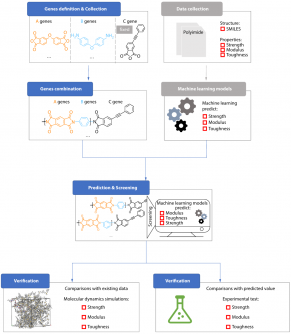Top Stories
AI Breakthrough Accelerates Design of Next-Gen Polyimide Films

UPDATE: A groundbreaking advancement in polymer design has emerged from the East China University of Science and Technology. Researchers have developed an AI-assisted materials-genome approach that is set to revolutionize the design of ultra-tough polyimide films, crucial for the aerospace and electronics industries.
The research, published online on September 2, 2025, in the Chinese Journal of Polymer Science, details how this innovative strategy drastically shortens the time needed to create high-performance thermosetting polyimides. Traditional methods have struggled to balance the competing properties of strength and toughness, but this new approach incorporates machine learning to optimize these materials like never before.
Conventional trial-and-error techniques for synthesizing polyimide films are slow and costly, often resulting in limited exploration of potential molecular structures. The research team has introduced a method that leverages machine learning to predict critical mechanical parameters—Young’s modulus, tensile strength, and elongation at break—across a staggering 1,720 candidate structures.
The standout formulation, named PPI-TB, demonstrated exceptional performance, achieving a modulus of 3.48 GPa—significantly surpassing established benchmarks such as PETI-1 and O-O-3. This breakthrough was made possible by constructing Gaussian process regression models trained on over 120 experimental datasets, allowing researchers to score and identify the most promising candidates for mechanical performance.
Prof. Li-Quan Wang, a leading figure in the study, explained, “By translating polymer fragments into genetic-like descriptors, we can treat molecular design like decoding a genome. This synergy between data science and chemistry allows us to explore material possibilities that would take decades by conventional means.”
The implications of this research are profound. The AI-driven materials-genome strategy offers a scalable framework for developing tailored polymers with desired combinations of stiffness, strength, and flexibility—qualities vital for microelectronics and aerospace applications. By replacing years of experimental iteration with predictive modeling and virtual screening, this method drastically cuts costs and development time.
Furthermore, the insights gained from this research could extend beyond polyimides, potentially influencing the design of a wide range of high-performance polymers. The integration of AI into materials science not only speeds up the discovery process but also enhances our ability to create lightweight, durable, and thermally stable materials that will power future technologies.
As the field of polymer science evolves, this breakthrough exemplifies how AI can redefine the landscape of materials innovation, making it an exciting time for researchers and industries alike. The potential to accelerate advancements in aerospace composites and flexible circuit substrates could reshape our technological landscape in the coming years.
Stay tuned for more updates as this story develops.
-

 Science2 weeks ago
Science2 weeks agoIROS 2025 to Showcase Cutting-Edge Robotics Innovations in China
-

 Politics2 weeks ago
Politics2 weeks agoJudge Considers Dismissal of Chelsea Housing Case Citing AI Flaws
-

 World2 weeks ago
World2 weeks agoBravo Company Veterans Honored with Bronze Medals After 56 Years
-

 Top Stories2 weeks ago
Top Stories2 weeks agoIndonesia Suspends 27,000 Bank Accounts in Online Gambling Crackdown
-

 Lifestyle2 weeks ago
Lifestyle2 weeks agoStone Island’s Logo Worn by Extremists Sparks Brand Dilemma
-

 Sports2 weeks ago
Sports2 weeks agoMel Kiper Jr. Reveals Top 25 Prospects for 2026 NFL Draft
-

 Health2 weeks ago
Health2 weeks agoStartup Liberate Bio Secures $31 Million for Next-Gen Therapies
-

 Health2 weeks ago
Health2 weeks agoTop Hyaluronic Acid Serums for Radiant Skin in 2025
-

 World2 weeks ago
World2 weeks agoHoneywell Predicts Record Demand for Business Jets Over Next Decade
-

 Politics2 weeks ago
Politics2 weeks agoNew Jersey Voters Urged to Register Ahead of November Election
-

 Lifestyle2 weeks ago
Lifestyle2 weeks agoMary Morgan Jackson Crowned Little Miss National Peanut Festival 2025
-

 Sports2 weeks ago
Sports2 weeks agoYamamoto’s Mastery Leads Dodgers to 5-1 Victory in NLCS Game 2







